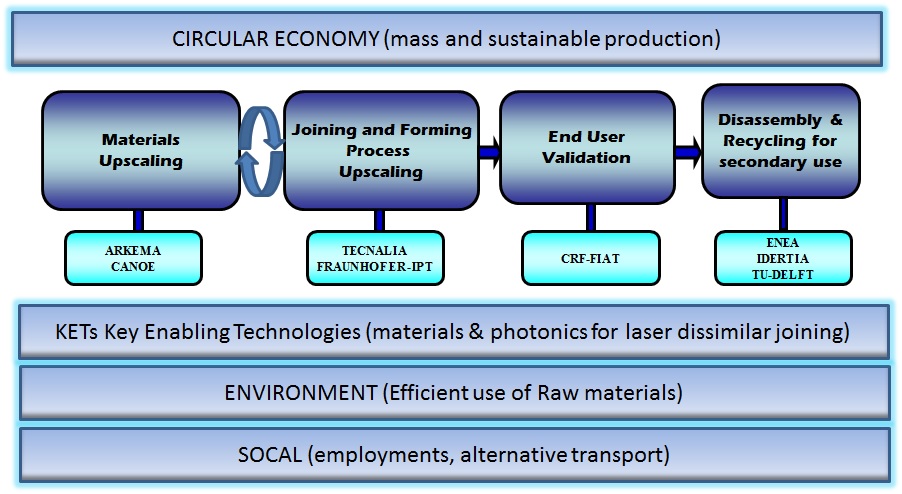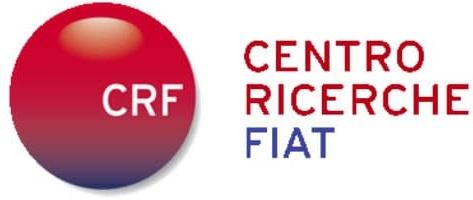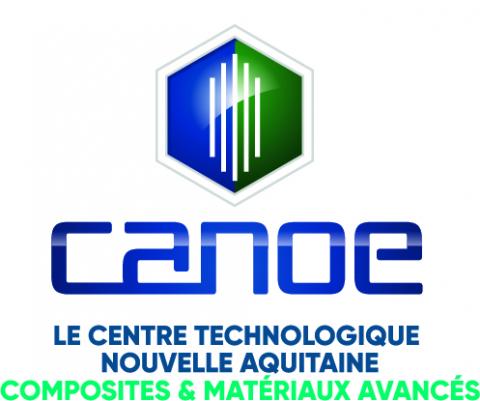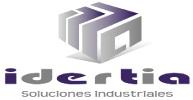Partners
CIRCULAR-TP partners combine their multidisciplinary skills and experience in order to achieve the strategic objectives of the project. The Consortium meets the required technical and exploitation capacities, boosting the existing raw materials sector through the market introduction of new materials, investment in new production and processing units. CIRCULAR-TP project covers the whole value chain for the up-scaling, evaluation and exploitation of highly productive technologies for metal-thermoplastic composites forming and joining with the aim of substituting full metallic components by highly hybridized components made of the combination of metal and thermoplastic. Some of the best placed companies, academia and research institutes focused on the development of raw materials and processes as well as innovative end-users are brought together in this project (5 of the 8 Partners are Core Partners of the KIC Raw Materials): One material supplier (Arkema), two research institutes in the domain of thermoforming and laser joining processes and novel materials development (TECNALIA, CANOE), a research institute developing equipment and processes for the manufacturing of semi-finished Thermoplastic composites (FRAUNHOFER IPT), one primary end-user (CRF), and one secondary end-user for recycled products (IDERTIA), one expert in LCAs elaboration (ENEA) and one institute developing innovations in recycling (TU DELFT). Each one representing very large application fields with an optimum balance for the achievement of the project objectives. Most of the partners are already experienced in previous/current projects like SUPERLIGHT-CAR, ALIVE, ENLIGHT, EVOLUTION, BEHICLE, YBRIDIO, FLEXHYJOIN, FORTAPE where a number of solutions have reached the TRL 5. Starting from that experience, CIRCULAR-TP focuses on well selected TRL5 technologies with a very promising potential to be up-scaled for mass production (>50k car/year), thus guarantying a significant and sustainable weight saving.

The management of the project will be carried out by ARKEMA. The management structure has been designed, covering all critical areas, as a comprehensive framework for making coordinated and structural decisions among the partners. ARKEMA as coordinator partner will report to the KIC all deliverables and any decision concerning the management of the project previously agreed among all partners. The identification of possible obstacles that could endanger the correct implementation of the project will take place throughout the life of the project. For that purpose, the project will follow a policy that lists the risks identified throughout the work performed and proposes the appropriate countermeasures. This will be done under the responsibility of the project manager. CIRCULAR-TP will implement a risk management plan, based on a rigorous and continuous risk analysis methodology involving all consortium members. The project coordinator will assess the global risks based on the information delivered by the WP leaders and reports by the WP members.
Arkema is a French chemical company involved in the production and commercialisation of chemical intermediates and polymers. With 19.000 employees around the world and a 2017 turnover of 8.4 Bn€, Arkema is among the 3 leading worldwide players for 90% of its product portfolio, being number one for such products as specialty long chain polyamides and fluorinated polymers, thiochemicals, etc. Arkema is especially the leader in high performance long chain polyamides, finding applications in such markets as oil and gas and automotive. The Polyamide powders proposed in this project are a new generation of products designed to match the requirements of structural automotive parts. The R&D work will be carried out in Arkema’s Polymer R&D facility located in Serquigny (France). This R&D centre is equipped with all the up to date synthesis, formulation, analytical, processing and characterization facilities.
FUNDACION TECNALIA RESEARCH & INNOVATION (www.tecnalia.com) is a private, independent, nonprofit applied research centre of international excellence. Legally a Foundation, TECNALIA is the leading private and independent research and technology organization in Spain and one of the largest in Europe, employing 1,300 people (around 150 PhDs) and with an income of more than 100 Million € in 2016.
TECNALIA is committed to generate major impacts in economic terms, by means of innovation and technological development, addressed by 7 business divisions, covering the economic sectors of Energy, Industry, Transportation, Construction, Health and ICT. TECNALIA has been granted over 250 patents and promoted more than 30 spinoff companies.
Founded in 1978, has the mission to develop and transfer innovative products, processes and methodologies in order to improve the competitiveness of the products of the FCA (Fiat Chrysler Automobile). Also through the cooperation with a panEuropean and increasingly global network of more than 1700 partners from Industry and academia, CRF develops research and innovation along the three principal axes of sustainability: Environmental Sustainability, which encompasses all aspects relating to energy efficiency as well as to the reduction of the impact on the environment over the entire lifecycle of the vehicle; Social Sustainability, focusing on the safety of transportation systems through the development of active, passive, preventive and cooperative solutions while addressing the mobility of all users irrespective of their specific needs; Economically sustainable competitiveness, oriented towards viable innovation, i.e., improving the performance and functionality of new vehicles in a costeffective manner.
The Fraunhofer Gesellschaft with more than 72 institutes, 26,600 employees and an annual research budget of over 1.9 billion euros, is Europe’s largest application-oriented research organization (https://www.ipt.fraunhofer.de). This project will involve the Fraunhofer Institute for Production Technology (IPT) as institution of FRAUNHOFERGESELLSCHAFT ZUR FOERDERUNG DER ANGEWANDTEN FORSCHUNG E.V. Fraunhofer IPT combines knowledge and experience in all fields of production technology. In the areas of process technology, production machines, mechatronics, production metrology and quality as well as technology management, they offer partners and customers tailor made solutions and immediately actionable results for modern production.
ADERA is a nonprofit organization created in 1967 to foster technology transfer between universities, research centers and industry in the SouthWest of France. ADERA develops and multiplies links between research and industry and coordinates technology transfer units and research platforms providing technological services to industry. CANOE is a department of ADERA which is in charge of the administrative, financial and legal aspects.
CANOE (www.plateformecanoe.com) is a Research and Technology Organization (RTO) created in 2009. The core technology of CANOE is focused onto the development of advanced materials and composites with a Technology Readiness Level comprised between TRL3 and TRL6: polymer formulation and thermoplastic compounds for fibre and plastic applications, multifunctional fibres (electrical and thermal conductivity, mechanical properties, sensors and actuators…) for textile and composite applications, fibre reinforced composites and thermoplastic prepreg. Impregnation and casing technologies implemented with original, new and fast heating conforming and inline controlling technologies.
IDERTIA SOLUCIONES INDUSTRIALES, S.L. is a SME located in Derio (Northern Spain) founded in 2010. Its main purpose is defined within the plastic injection technologies, developing and manufacturing parts mainly for the automotive sector, as well as manufacturing molds and tools (quality control fixtures, test fixtures, etc.).
One of its goals is to implement in the industrial sector innovation, technology and excellence to the services annexed to the product and its industrialization. To this end, it incorporates within its strategy:
- R&D activities, disciplines and methodologies of work for the optimization of industrial processes towards product improvement.
- A team of professionals with proven experience in different sectors and technologies.
- Lines of innovation and satisfaction already developed and contrasted in the sector.
Italian National Agency for New Technologies, Energy and Sustainable Economic Development is a large stateowned research institute in Italy which has several key advantages. ENEA’s scientific research and technological development are carried on at its 9 Research Centers and 5 Laboratories, endowed with a wide range of expertise, advanced facilities and instruments put at the disposal of both the ENEA research programs and the Nation's scientific and entrepreneurial communities. ENEA works also as an agency in supplying support and advanced services to local and national Public Administration and enterprises in several areas. Agency’s activities are devoted to basic, mission oriented and industrial research; new technologies and advanced applications; dissemination and transfer of research results, thus promoting their exploitation for production purposes; provision for public and private bodies with high-tech services, studies, measurements, tests and assessments; training and information activities aimed at broadening sector expertise and public knowledge and awareness.
Delft University of Technology (http://www.tudelft.nl/) is the oldest, largest, and most comprehensive technical university in the Netherlands. With over 22,000 students and 2,200 scientists (including 200 professors), it is an establishment of both national importance and significant international standing. The University collaborates with other international educational establishments and research institutes and has partnerships with governments, branch organizations, numerous consultancies, the industry, and companies from the small and medium business sectors.
Society is TU Delft’s continuous incentive for research. Health, energy, environment and infrastructures & mobility are today's major social issues. That's why TU Delft pays extra attention to research in these four domains. Fundamental research is part of this, because TU Delft aims to find solutions for tomorrow’s problems as well as today’s.












